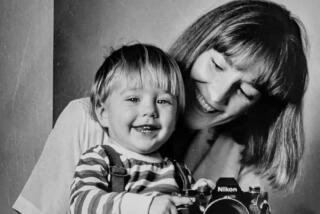BBC directive for ‘The Diary of Anne Frank’: show her as the teen she really was
- Share via
Screenwriter Deborah Moggach was given a strict directive from the BBC for her adaptation of “The Diary of Anne Frank,” which airs on “Masterpiece Classic” Holocaust Remembrance Day on Sunday.
“They wanted an Anne for this generation, so young people could empathize with her and feel she was just one of them,” says Moggach.
“She was a very typical teenager. I wanted her to be a normal girl, so she wasn’t sort of distanced by history from young people watching it now.”
Available in some 60 languages -- it was first published in 1947 -- “The Diary of Anne Frank” is the critically acclaimed, funny, poignant, sad and even optimistic chronicle of Anne Frank, a German-born Jew who spent most of her young life in Amsterdam.
Anne Frank began to keep a journal at the age of 13, just three weeks before she and older sister, Margot, went into hiding from the Nazis with their parents, Otto and Edie, and four other people -- the Van Pels and their teenage son, Peter, and dentist Fritz Pfeffer -- in sealed-off attic rooms above her father’s office building in Amsterdam. Anne changed the names of the non-Frank occupants in her diary to protect their privacy.
The last entry was in August 1944, soon before they were caught and arrested.
Anne died in March 1945 in Bergen-Belsen concentration camp. Only her father, Otto, survived. And it was he who published the diary in 1947.
Frances Goodrich and Albert Hackett adapted the diary for Broadway in 1955; George Stevens directed the classic film version, which was nominated for several Oscars including best film and director. Over the years, there have been several adaptations of the diary.
For this version, the very protective Anne Frank-Fonds (a foundation created by Otto) gave Moggach permission to use Anne’s actual words in the voice-over.
“In nearly all adaptations since [the original play], writers have had to use biographies of her but not her real words,” she says. “Nothing is as good as her real words.”
“Masterpiece” executive producer Rebecca Eaton agrees that previous versions have romanticized Anne as this “very sweet ideal teenage girl. I think this is arguably the closest to who she was.”
Anne fought with her mother, fell in and out of love with Peter and even had problems with her father, “who had been her champion and hero,” says Eaton.
The diary itself has gone through several incarnations over the years. Moggach used the definitive edition translated by Otto Frank and Mirjam Pressler, which also features five previously unpublished pages discovered in 1998.
When Otto Frank was initially editing the book, he had excised several passages, says Moggach, “because he thought it would be indiscreet. Anne was very sharp and she noticed stuff about her parents’ marriage -- for instance that it lacked a sort of passion. . . .”
And there were two “quite sexual passages where she is examining her own private parts, which are quite hard-core even now. Quite understandably, he didn’t think that was for sharing with the world.”
Anne also rewrote her diary over the two years. “There are sort of three different versions,” Moggach says. “She went back over it. She was honing her skills.”
She was especially inspired after hearing the exiled Dutch government on the radio telling the citizens to write diaries and letters so the world would know their suffering under the Nazis.
“From then on Anne realized the diary could be an important document for the world after the war, whether she survived it or not,” says Moggach.
Ellie Kendrick, the 19-year-old actress who plays the title role, never read the book before getting the part.
“I thought it would be very kind of somber, depressing account,” she admits. “I was amazed how full of wit and verve the diary is. I think it’s very hard not to like the Anne Frank that was recorded in her diary.”
More to Read
Only good movies
Get the Indie Focus newsletter, Mark Olsen's weekly guide to the world of cinema.
You may occasionally receive promotional content from the Los Angeles Times.










